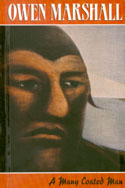 A Many Coated Man by Owen
Marshall.
A Many Coated Man by Owen
Marshall.
Reviewed by lan Dixon.
THE PRESS, Christchurch Saturday, April 29,1995
A Landmark in our Literature
Among what must now be the thousands of novels I have read so far in my lifetime this one stands out in a special way. It is not a question of my liking it or enjoying it so much as by my being intrigued by it as a story and by the remarkable quality of its prose. How does a novelist catch such an idea? Aldous Slaven is an orthodontist by profession who has a 10-acre lot in the countryside near Christchurch. While painting his roof one weekend, he falls when the ladder slips. He grabs the roof guttering with one hand and the power line with the other. The result is horrendous burns and a long stay in Burwood Hospital. He becomes aware in those pain--filled weeks of a great change in himself, apparently brought about by the electric shock.
When later on he is asked to give a talk to the civil defence organization on his experiences he overwhelms his audience of 23 people with his remarkable power of speaking and his insights into human needs and longings. The word spreads quickly and Aldous becomes a key-note speaker at a number of events. His oratory takes him to huge public rallies where the crowds build to hundreds of thousands. Govern-ments tremble. The anxiety among the establishment is appalling.
There are huge consequences, which are ultimately tragic. Owen Marshall's artistry with words is exceptional. Here is a sample: "It is cold and still when Slaven and Miles drive from Blenheim to Tuamarina on the Picton road. The grass is bowed down with the melt water of the night's frost and where any stock have disturbed it their tracks are clear within the milky paddocks
"The trees are motionless and from a weatherboard farmhouse a trail of chimney smoke gradually topples to one side. Two border collies bark them past, the heads jerking with each release of sound." . So it goes on through the whole book. If the novel ever becomes a movie, which is inevitable, it will be difficult to capture the prose -that is so essential to Marshall's style.
He has a genius for observing the finest detail of the things we ordinarily only notice in passing but which we gladly recognise.at once when they are pointed out. This gift of fine detailed description has been observed in Marshall's short stories. But I think it may have its downfall at times in an extended novel. There were two sections in this story where my attention eluded me. The narrative seemed to have gone into recess: I especially felt this in a section near the end which had something of an excursus on Erewhon and Samuel Butler.
The whole novel is a brilliant satire on charismatic oratory and its sad involvement in the politic al power game. But intermingled wi th all that are moments of tender personal revelation and insight utterly frank and earthy. It really is a great novel and may well be seen as a landmark in our national literature. I have only one serious complaint, which I direct solely at the publisher. The chapters should be defined and numbered! They are a necessary mental punctuation for the reader- particularly if a partner is asking how long till lights out.